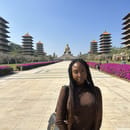If you were to ask me two years ago where I would be after graduating from college, the thought of teaching English and American culture in Taiwan would not have even crossed my mind. Now, as I finish my Fulbright English Teaching Assistant grant in Taiwan, reflecting on my experience has affirmed that some of the best post-college career paths are anything but linear.
When I first attended the University of Central Florida in the summer of 2018, I arrived with long-held aspirations to attend medical school so I could become a pediatric endocrinologist. (Since I have Type 1 diabetes, it only felt right to follow that career path.) I majored in biomedical sciences and followed the traditional route toward medical school, taking classes like human anatomy and physiology. However, despite still wanting to become a doctor, I found myself gravitating more toward social sciences through my coursework and extracurriculars. Realizing I could major in anything and still pursue a career in medicine, I switched my major to sociology, with a focus on social determinants and racial health. I had some concerns that deviating from my plans could knock me off the course toward my goals, but I decided to listen to my gut and make the switch anyway.
And I’m so glad I did. In changing my major, I experienced the “when one door closes, another door opens” sentiment firsthand. Thanks to numerous opportunities the department of sociology offered me, including conducting independent research on social epigenetics, I was recommended by my honors college to apply for the U.S. Student Fulbright Scholarship Program. Admittedly, I was hesitant at first. Doing the program would require me to take a gap year before applying to medical school — and after already not majoring in a science-related field, I worried this would be yet another thing that made me a “nontraditional” med school applicant. However, I felt myself drawn toward the opportunity. Not only would I be able to continue my studies by exploring the sociocultural disparities within different communities, but most importantly, despite still wanting to become a doctor, I did not want to miss out on a possible once-in-a-lifetime experience.
So, I went for it. After graduation, I relocated to Kaohsiung County, Taiwan, to begin my English Teaching Assistantship (ETA) grant, teaching at two elementary schools — one in the city and another in a rural area. And once I got there, I knew I’d made the right call.

Working at these schools, I saw the parallels between the fields of education and medicine play out in real life — namely, the social inequities that ultimately affect how one move throughout the world. At the rural school, I noticed many of the students did not have access to the necessary tools to have a quality education, much like how many individuals cannot receive quality medical care due to their financial backgrounds. I learned how much one’s environment can influence their life. And I learned — as I was immersed in such a different cultural and racial setting from the one I was used to — many of these locals experienced the same issues prevalent back home in the States.
Despite not following a traditional path to pursuing medicine, through this “detour” in Taiwan, I became even more ready to become a doctor than I was before. But not only that, I was also able to explore different career options during my Fulbright experience, such as writing. One of the reasons I chose the Taiwan program was to participate in the ETA Storybook series, in which grantees create their own illustrated storybooks for local elementary and middle school students, bridging the gap between Taiwanese culture with the English language. Seeing that Kaohsiung did not have an ETA storybook yet, I decided to change that. With the help of my cohort, we were able to publish the first bilingual ETA storybook in the Fulbright Taiwan series, and the first ETA storybook for Kaohsiung. Ultimately, while I may have been in medical school if I decided to apply prior to graduating from UCF, moving to Taiwan instead aided me in accomplishing another goal of mine: becoming a published children’s book author.

Now, as I look back on my entire Fulbright journey, I realize there is so much more to life than being “on time” with the goals society set for me — and even the goals I set for myself. Through the Fulbright program, I was able to experience a new language, culture, lifelong friends, and the opportunity to connect with a country I now consider a home. I gained invaluable experiences that I couldn’t have dreamed of having had I followed a traditional path. Most importantly, my Fulbright grant experience provided me with transferable life lessons that will not only make me a more competitive medical school applicant, but also a competent doctor — which I know I will become, in my own time.


